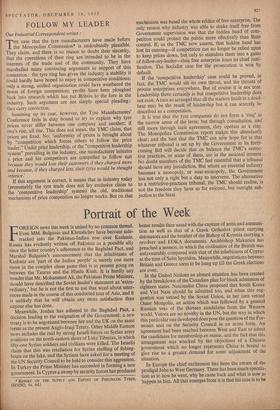FOLLOW MY LEADER
Our Industrial Correspondent writes : THE case that the tyre manufacturers have made before the Monopolies Commission* is undoubtedly plausible. They claim, and there is no reason to doubt their sincerity, that the operations of their ring are intended to be in the interests of the trade and of the community. They have marshalled many convincing arguments in support of this contention : the tyre ring has given the industry a stability it could hardly have hoped to enjoy in competitive conditions; only a strong, unified organisation could have weattiered the storm of foreign competition; profits have been ploughed hack into research which has put Britain to the fore in the industry. Such argument are not simply special pleading: they carry conviction.
Summing up its case, however, the Tyre Manufacturers' Conference feels in duty bound to try to explain why tyre prices never differ between one company and another; if one's rise, all rise. This does not mean, the TMC claim, that prices are fixed. No; 'uniformity of prices is brought about by "competition which forces others to follow the price leader." Under price leadership, or the "competitive leadership system" prevailing in the industry, one manufacturer initiates a price and his competitors are compelled to follow suit because they would lose their customers if they charged more and because, if they charged less, their tyres would be thought inferior.'
If this argument is correct, it means that in industry today (presumably the tyre trade does not lay exclusive claim to the 'competitive leadership' system) the old, traditional mechanism of price competition no longer works. But on that mechanism was based the whole edifice of free enterprise. The only reason why industry was able to shake itself free from Government supervision was that the hidden hand of com- petition could protect the public more effectively than State control. If, as the TMC now asserts, that hidden hand has lost its cunning—if competition can no longer be relied upon to keep prices down, but only to stimulate them into a game of follow-my-leader—then free enterprise loses its chief justi- fication. The Socialist case for the prosecution is won by default.
If the 'competitive leadership' case could be proved, in fact, the TMC would slit its own throat, and the throats of private enterprises everywhere. But of course it is not true. Leadership there certainly is but competitive leadership does not exist. A race so arranged that all the starters finish in a dead- heat may be the result of leadership but it can scarcely be described as a competition.
It is true that the tyre companies do not form a 'ring' in the narrow sense of the term; but through consultation, and still more through tacit agreement, they operate as a ring. The Monopolies Commission report makes this abundantly clear; and the best that the TMC can now hope for is that whatever tribunal is set up by the Government in its forth- coming Bill will decide that on balance the TMC's restric- tive practices, or some of them, are in the national interest. No doubt members of the TMC feel resentful that a tribunal should have any jurisdiction. But where an essential industry becomes a monopoly, or near-monopoly, the Government has not only a right but a duty to intervene. The alternative to a restrictive-practices tribunal, the TMC should realise, is not the freedom they have so far enjoyed, but outright sub- jection to the State.


































 Previous page
Previous page